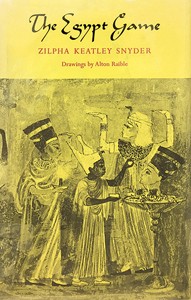The Egypt Game
This article needs additional citations for verification. (November 2015) |

The Egypt Game (1967) is a Newbery Honor award winning novel by Zilpha Keatley Snyder. The story, set in a small college town in California, follows the creation of a sustained imaginative game by a group of six children in a storage yard.
Plot summary
In August, two young girls named Melanie Ross and April Hall, along with Melanie's four-year-old brother Marshall and his stuffed octopus Security, begin playing in the storage yard of A-Z Antiques, a store which sells curious and used merchandise and mostly many things. The children enter through a loose board in the fence. The owner of the store, "The Professor," is a mysterious man of whom the neighborhood children are afraid. April has met him once and finds him and his store interesting.
Then April, Melanie, and Marshall research actual Ancient Egyptian belief systems and practices, and create their own rituals intended to reproduce them more or less authentically. They are joined by Elizabeth Chung, a nine-year-old [Chinese American] girl who moves into their apartment building with her mother and two younger sisters. Elizabeth's name in the game is Neferbeth.
A little girl from the neighborhood disappears and is found murdered, the second such crime in a year. All the children from the area are kept indoors for several weeks, and the Egyptians have no opportunity to visit their shrines. Moreover, police were seen going into the Professor's shop, sparking local rumors that he is a suspect.
Around the middle of the story Marshall loses his stuffed octopus Security in the yard, after the Egypt gang perform an Oracle ritual that they had recently created. At Halloween the children desert their trick or treat group to return to Egypt surreptitiously and are discovered by their aggressive, outgoing classmates Toby Alvillar and Ken Kamata. Melanie and April fear they will ruin everything, but Elizabeth invites them into the game if they will keep it secret. Ken is unenthusiastic and nonchalant initially, but Toby is fascinated, and quickly brings in useful material and ideas.
Finally there were allowed to play outdoors again, the "Egyptians" devise an oracle, connected to Thoth, and are unnerved by some of its answers. A series of unexplained events lead them to wonder if they should stop playing completely.
April returns to Egypt at night to retrieve a lost schoolbook, and is attacked by the murderer. The Professor witnesses the attack, breaks the back window of his store and shouts for help. The murderer is at last identified as the mentally ill cousin of the local grocery store owner, and the Professor tells the children that he has been watching the game the whole time, intrigued by how they interpreted and recreated Egyptian myths and history. A widower, he became reclusive after his wife's death. As a Christmas gift, he gives a key to each of the six children to access the recently locked storage yard.
The children feel that the game cannot continue because its essential secrecy has been destroyed. The book ends with April raising the possibility of a new game involving Gypsies. Snyder followed up on this possibility by writing The Gypsy Game (1997).
